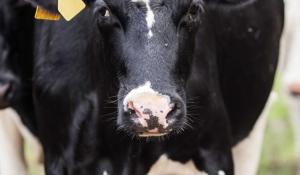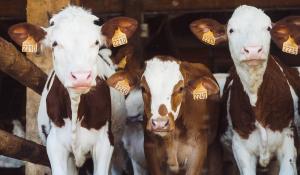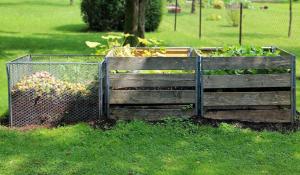The Problem with Industrial Agriculture: Energy Intensive and Damaging to Social and Environmental Health
The mass industrialization of the US agricultural system can be traced back to policies promoted during the Nixon administration by USDA Secretary Earl Butz, encouraging farmers to “get big or get out.” Support shifted from small family farms to large, highly mechanized mega farms dependent on vast monocrops and costly inputs. This system is proving to be unsustainable for farmers and highly damaging to the environment, polluting local ecosystems and contributing to global climate change.
Industrialization of the US agricultural system has resulted in increased chemical use, degradation of soils, poor animal welfare, and the death of the small family farm.
Mechanization Leads to Monocropping and an Increased Use of Chemicals
Our current agricultural system is highly dependent on monocropping. This system encourages farmers to grow one crop at a time, allowing for increased mechanization and distribution of pesticides and fertilizers. In fact, monocropping requires increased chemical use because vast swaths of the same plant are more susceptible to pests, and a lack of crop diversity deteriorates soil health. The use of genetically engineered (GE) crops or GMOs in industrial agriculture further promotes this unsustainable system of monocropping and overuse of synthetic pesticides, herbicides, and fertilizers.
The overuse of pesticides has led to a rise in resistant superweeds, requiring increased use of chemicals and dependency on more toxic varieties, such as 2,4-D and dicamba. This puts the health of farm workers, farm communities, wildlife, and waterways at risk. Microorganisms in the soil are also affected, leading to soil depletion and decreasing the soil’s ability to pull excess carbon from the atmosphere. In this negative feedback loop, poor soil health requires farmers to use additional energy-intensive synthetic fertilizers to make up for soil deficiencies.
Intensive Animal Agriculture: Too Big for its Own Good
Industrial agriculture includes the raising of millions of farm animals in unnatural conditions. Most GE crops are used as animal feed, allowing for intensive animal farming operations to take place indoors. Factory farms, or concentrated animal feeding operations (CAFOs), are one of the main reasons agriculture is a top contributor to climate change. CAFOs house hundreds or even thousands of animals per facility in crowded and unnatural conditions with little to no access to the outdoors. This system of agriculture focuses on efficiency and economy with little to no regard for the well-being of animals, the environment, or consumers. CAFOs are linked to numerous animal welfare and public and environmental health concerns.
Due to the mass quantity of animals in one area, animal waste builds up and releases high levels of methane into the atmosphere. Methane is one of the leading contributors to climate change, causing more short-term damage to the environment than carbon dioxide. Animal waste also poses a contamination threat to soil and waterways, impacting communities downstream from CAFOs.
To make up for the crowded and unsanitary conditions, animals raised in CAFOs are regularly given sub-therapeutic (non-medical, daily low dosage) doses of antibiotics. In addition, antibiotics are often used to aid in growth promotion, a usage discouraged by the FDA. The continued sub-therapeutic usage of antibiotics is contributing to the rise in antibiotic-resistant bacteria, an epidemic that claims over 23,000 lives a year in the US alone.
The Solution: Adoption of Organic, Regenerative Agriculture
Green America works with consumers, farmers, companies, and allies across the US to reduce the use of toxic chemicals, GE crops, and monocropping. We partner with stakeholders dedicated to improving the lives of farm animals and the health of farm workers and consumers. We advocate for regenerative agriculture that replenishes the soil, sequesters carbon, provides healthful food, and makes a place for small and mid-sized family farms.

















